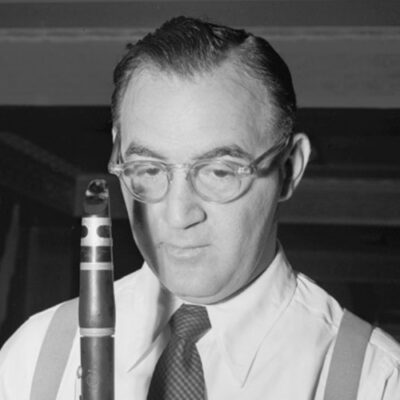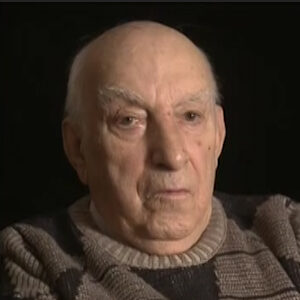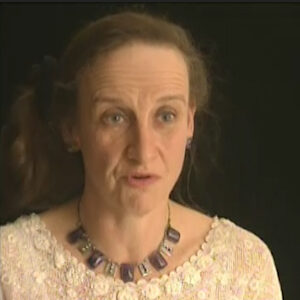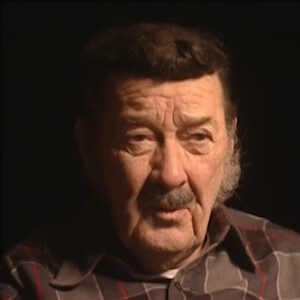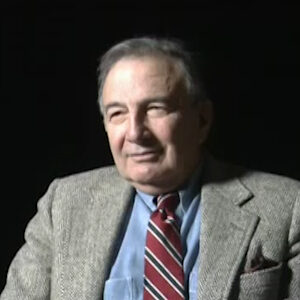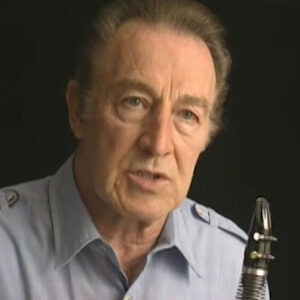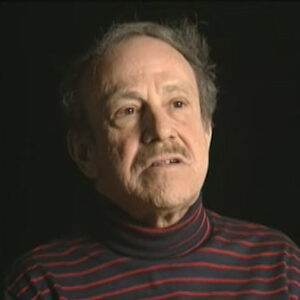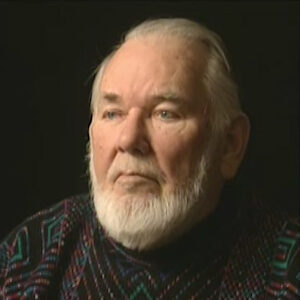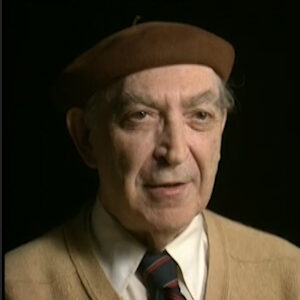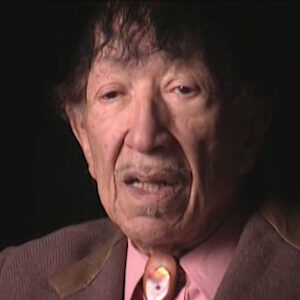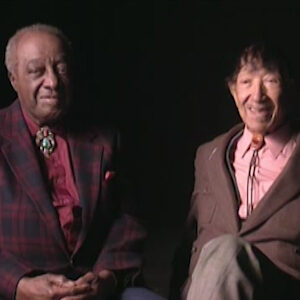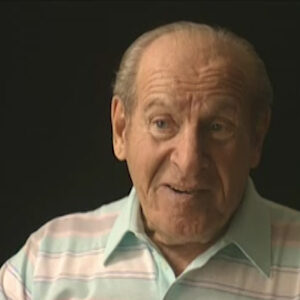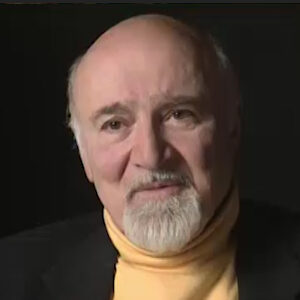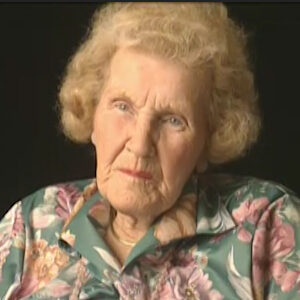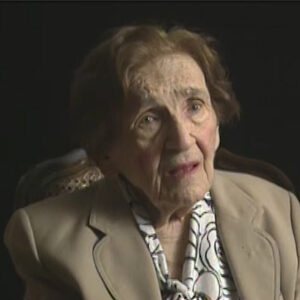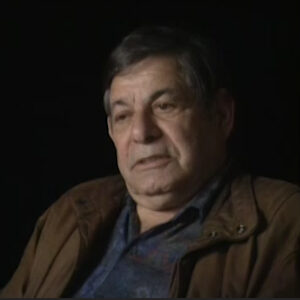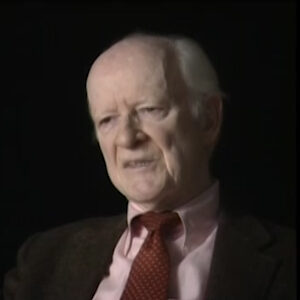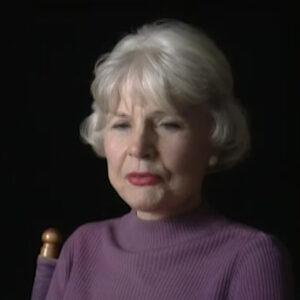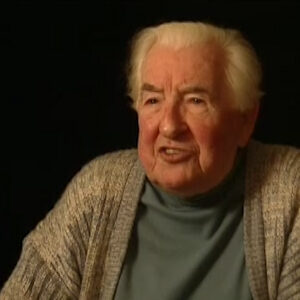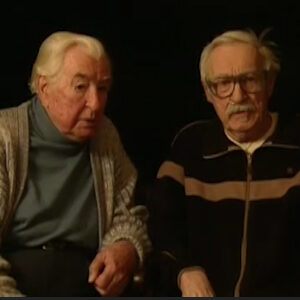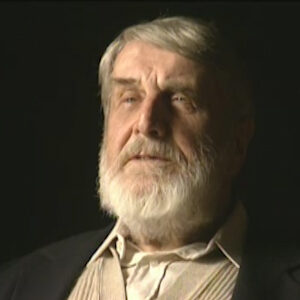Speaker He said, OK, we’ll try to get people to leave.
Speaker Oh, yes, I remember doing a record date Walmer at the Congress.
Speaker We did several. But one particular date, I remember after the guys got through, they were packing the instruments and Benny whispered to me. Stick around. Go on. And evidently, he told Teddy Wilson and Dean. To hang around two, which we did. And by gosh, we had. Wonderful time doing just the trio and me. And the tunes were all my life. And you and me. Too good to be true.
Speaker And believe it or not, on the label, it said Helen Morde with the Benny Goodman Trio.
Speaker I got top billing, if you please. It’s. You there’s not going to be shown only in Canada. I did work with him. He’s great. It was great. Huh.
Speaker That’s good. Glad to hear he was looking to work. Jimmy Maxwell told me a story about when he went with John Steinbeck to hear him in some informal always. Life goes to a party, was photographing a jam session. And he was like acting like the boss and bossing everybody around and telling Duke’s guys when to play and bass.
Speaker Steinbeck picked him up and took him out, threw him down the stairs.
Speaker You heard Benny Goodman before you met. You must’ve heard him. And you heard.
Speaker I’ll tell you about you tell. All right. Let me clear my throat.
Speaker It was me.
Speaker The first time I ever heard of Benny Goodman was when.
Speaker Friend of mine, George Barzman, said that a staff musician at NBC is forming his own band and his name is Benny Goodman and he’s looking for a singer. And this friend of mine knew that I’d been fooling around with vocalist, I think, because I played piano first. I was a kind of player always up until that time in college time. We found some form, some of you playing piano. Oh, you do, huh? What is that? What group is that? Well, anyway, so I said Benny Goodman. Who’s that? Never heard of him. He said he’s a great clarinetist on the staff. And I said. And so I went down town to one of the studios where he had his band rehearsing. And that’s when I met Benny. And all the rest is history. He heard me right on on the spot and said, we’re opening at Billy Rose’s Music Hall. Oh. I said, no nightclubs for me. I’ll audition with you, but I won’t go in the club with you. And I think it’s fun to add that I had a very juvenile attitude towards then at nightclubs of big fat guys with cigars. Half of them gangsters, the showgirls in nightclubs. And so I would not sing in a nightclub. But then when Benny call me later and said, audition for the Let’s Dance National Biscuit program on NBC, I was all ready to go. And twenty five bands auditioned. And we got the job. We got the job. Remember the song sang saying, hell no.
Speaker Talk a little bit about about the last dance. How we set up what we see in the future.
Speaker We’ll show that picture, huh? Well, let’s say it was a huge studio or NBC 8h in those days. It was huge. Almost like a theater would be an online platform. We’re looking at the bandstand now. I’m in the audience. On the left was Benny Goodman Group. In the center. Was Xavier Kogod, who played the Latin rhythms. And on the right was Carl Murray, who played the ballroom type thing type music.
Speaker And for the studio audience, we’d run every Saturday night from 9:00 in the evening till one the next morning so that the coast could get us, could hear us. And Ray Hendrix’s singer, the male vocalist with Bernie and I, we would dance to Benny’s music in between our vocals. And there was a Latin couple dance to God. And the ballroom dance team to dance to Kelmer all to entertain the people in the audience. And it was fun. Really was fun.
Speaker Now, the band evolved during the time you were in there first, and the great example you gave before was the drummer. There was a guy you said was like, oh yes.
Speaker I remember standing in front of the band during rehearsal in the studio with Benny in the afternoon and Sunday afternoon. And he said to me, oh, by the way, there was a guy, Harry King, who played drums, you know, cymbals on the snare. And that’s the only kind of drummer I ever saw. Heard the choo choo choo choo. So all of music. And Benny said, I sent for Guy Gene Krupa, Chicago. He’s a drummer. When you hear him and I turn him, I said, what’s a big deal about a drummer? Well, pretty soon we all got to know what Benny meant about Gene being a great, great.
Speaker And you say before he was also on the show.
Speaker Oh, Charlie, what a showman. Just just so natural. And none of it put on just that just came naturally. And you know that when we played in places down in Texas in the summer, we’d be so hot. Do you know the gene wore long underwear under his white suit or whatever uniform too? He perspired that much. He had to wear underwear underneath. So wouldn’t this suit wouldn’t get so, too, because you know how hard he worked. Really something that’s incredible. You never heard that.
Speaker How about other guys that joined the band? You were saying that they just sort of aren’t sure when he joined that when Buddy came in and joined the band.
Speaker I don’t remember the Times or at first say, well, Bunny was there in the beginning on the Let’s Dance show. And you don’t have to tell you what a great musician he was. But he did something that was a no no with Benny. And that is drink. He. Fell off the bandstand during a radio show one Saturday night, just sideways, right? Right off the bandstand. And luckily, a manic twined was only jail, a venue studio musician. He was able to come and sit in and play well, and that was it, right? His voice was wonderful. Well, anyway, he stayed with the band. Benny seemed to overlook it because of his wonderful talent. But eventually he did leave the band. I do have to tell you that one time, Benny. But brand new case for his horn. Nobody, no doubt. And here is line with red velvet. And here is a place for the horn and the mouthpiece and a bottle of gin. Right. Red velvet lined case.
Speaker That was plenty of. How would you not look it? I just did. Pardon me.
Speaker It’s all right. If you look up, we’re looking into the direction, but don’t make eye contact with these guys because things could be looking at the ceiling.
Speaker So that’s fine. If you stop at someone, it’s. I don’t know what you’re saying.
Speaker Yeah. Now that I read stories during the time you were doing a Web stand show, there were occasionally Betty would still take the band out on one nighters, but definitely.
Speaker Oh, yeah.
Speaker And it was one story about a bus that was going up to upstate New York and its crazy bus that went up the hills and people had to get out and about the bus went up the hill and ended with some problems that it was like he didn’t have it together. You had to take a band on the road.
Speaker What do you mean? We called it a Luna Park bus and Luna Park in Coney Island near across the river there.
Speaker It broke down and it was in wintertime with snow up to here. And we had a terrible time, really. And but when you’re that young, you take everything in stride and you just go ahead and do your thing.
Speaker So what was it? Describe what the thing was like. What were the what was one night like? Where would you go and what?
Speaker Well, the one night I remember in particular was up in Binghamton, New York, where it was. Must have been 98 below. Was so cold and snowy and terrible. And there was a marvelous crowd there. And we needed some help to get out of the crowd. On the way out after the job was done. And so I just would follow it with my head down and he’s walking ahead of me. And this guard or whatever it was, was separating people so we could get out. And I’m following Bernie. Mind you, my head is down and I’m not looking. And my finally, when I do look up, I’m in the men’s room. Then he led me right into the men’s room. I know God. But that is in relation to one nighters. And Ben is being so absent minded.
Speaker That was what it was for. He told me about those things. He wasn’t used to the public being so door and worried about a guy, about his coat.
Speaker Oh, my gosh, yes. In the very beginning, there were occasions when many would wear tails, which you don’t see anymore. Shoot me. And there’s one time I know he was going through the library just to get numbers for the guys to play. And while he had his back to the audience, kids were up close to the bandstand. And this one kid pulls on his tails evidently to say, you play this or whatever. We’ll never know. And Benny had his horn in the right hand and he turned around and raised it and it was about to hit it.
Speaker And I said he was he just didn’t know how to handle public. And I said to him, Benny, these are the people who pay to come in is here.
Speaker You got to treat or. No, I didn’t say that in front of, you know. But I never saw such anger and I never saw Benny do anything violent before or react violently. It was just he was going to get with his horn. It was really something.
Speaker It was. I don’t know whether it was earlier than this. I guess maybe it had been before he started singing with the band that he had invited you on a date.
Speaker Well, when I first met Benny. Well, that’s so that’s now. Yeah. OK. After I met Benny and he heard me saying and said from a single event, he asked me out and I said, sure. And this one time I was late or forgot. I don’t know why, but I remember coming home and there was Benny sitting and talking to my mom. He’d been there, I don’t know, an hour or two. And I got along just fine. And Benny took me. At first I had to see his brand new car, Ford, that he bought in Connecticut. And we’d go out occasionally on dates. And this.
Speaker The time he took me to Mazzaglia Leonys in New York. I believe that’s the name of the place.
Speaker Marmolejo again, Andre.
Speaker You would take me to dinner? Whatever. And this one night he took me to mumble Leonys in New York.
Speaker And.
Speaker We went upstairs and they had like little booths. Where they served you privately and there were people in each post, you know. And it took no I’d never been there before. And he.
Speaker Ordered dinner, by the way, Benny was a fabulous gourmet. When it came to food, he did all the ordering. Anyway, we got talking and the subject of his dad came up.
Speaker And in relating what had happened to his father, who had a terrible accident on the ice. Chicago slipping and when you got off the trolley car, he was killed. Whether another car came along or whether it was really fault. I don’t remember. But, Benny.
Speaker Broke down and cried like a baby. Talking about his dad. It was so touching. And it was the one and only time I ever saw Bernie that emotional when he spoke of his father and what wonderful things his dad did, as poor as they were to find the money to send them to Holehouse House, or which that was free, wasn’t it, at that time.
Speaker That’s for the lessons that there was somewhere.
Speaker Hey, well, whatever. Yeah, he found the money so that the boys, Harry, Bernie Irving and Freddy would learn an instrument which touched him.
Speaker So at that time, did you talk to you about his father, how hard the father worked, the different jobs that he had?
Speaker You know, that’s what he wanted to do, spoke of his dad. That’s what he said. How hard he worked. And yet found the money to do all that for the boys, which he thought was so right. And it really got to me. We just cried like a baby.
Speaker There was another nice thing you talked about and let’s dance. He trusted you musically. And then he had a sense that you had good taste and he would take you into the control room.
Speaker And you talk about one of the things that I’m very proud of, and that is that Benny Goodman, the genius, said he was respected my ear musically, and he would tell me to go into the control room when he was rehearsing the band for Let’s Dance and give my opinion of how it sounded or the balance or the notes or whatever he could.
Speaker Second, I will tell you about something that will get this one way to tell the when you. OK.
Speaker One way later on when the band was becoming established, we went on the road and did quite well. We played at the Ritz Carlton in Boston. And I remember flying on the roof and all. We had dowagers in there and a society, if you please come hear us, which was great. And I’ll never forget one night it was raining and he or morning or whatever roof they had their lake and the dowagers was standing in front of the bandstand with umbrellas, if you please.
Speaker It’s funny, I just to think of that. And by the way, such an elegant place. And I put my beautiful, beautiful silver fox coat over a chair to get up to sing, you know, for the evening.
Speaker And at the end of the night it was gone with all four magnificent Ritz Carlton clientele. I came no more silver fox. And guess what? I told the president of the hotel that time. His name is Ed Weiner. Weiner, WDIA, New York. And tell them what had happened. And by gosh, evidently they were insured. And he gave me money to go out and buy a new cake, which I did, which I thought was very nice.
Speaker Good thing you, huh?
Speaker Oh, by the way, a couple of nights later, I’m checking I’m not checking in, but returning to the hotel. And as for my key at the desk, and they said, oh, there’s a package here for you. And oh my. And this huge box. And what is it? They returned my silver fast jacket that looked like I’d been lying out in the rain all night long. It was looking like a rat. It was horrible. You might me turning a thing like that. It’s like such couldn’t dudgeon swiped it and dropped it or something or more out in the rain. And just left it in a package of Misho on board.
Speaker Tracy, tell him tell them what it was like with the venue, rehearsing the band and that it was. It was, you know, drove everybody else crazy. But the.
Speaker Oh, yeah. It was such a perfectionist and he would go over phrase by phrase by phrase, time and time again till the guys, I’m sure, were ready to kill him. But it was great for me. I could not read music.
Speaker And by the time they got through rehearsing, I knew the tune backwards, upside down and backwards. It was great for me.
Speaker So they did the job at the, uh, at the Let’s Dance. And and before you went on the road, there was an engagement at the Roosevelt Hotel and you were telling me about the Roosevelt Hotel.
Speaker I think they did that come after Let’s dance.
Speaker I don’t recall whether it was before or after. I think it was after.
Speaker It was like the first job. Alexander him in. It was going to be ready before you went.
Speaker Oh, yeah. We just died a horrible death in there because Benny’s kind of music was anything but dinner, music and people who came in, they were used to Guy Lombardo, you know, people like that. And before that, I’d been at N.A. with David Rubinoff and Bob Crosby was the male vocalist. But we lasted only two weeks in there because Bernie’s music was not fit for the Roosevelt Grill. It just wasn’t right. And so we got our notice and that was the end of that.
Speaker Remember how many took the sort of the let downs in those days and take them on the chin to be paid to get them down when things weren’t going down, just so many would just go into a deep blue funk when the band failed. What’s a better word? We didn’t go over like in Denver, which is well known now, the second series.
Speaker Did you get. Was there an overlap there at the beginning? My question. I didn’t catch it here, but I think that there might have been we should pick you up and then when you win it, you can wait till I finish.
Speaker Sorry. It’s OK just to give you. So I’m sorry.
Speaker I don’t care about my thing just so it doesn’t step on your your line. I don’t want to get in your way. OK, so, um, start again with Penny would go in a booth and listen up a little girl.
Speaker I don’t like that expression anyway.
Speaker All right, let’s go. Go on. To just what it was like starting out was great. Tell me the names of the places on this. But on this first road trip where you have you were one meadow.
Speaker Oh, I’m travelling in Jersey and then Rocky. Uh, yeah. Yeah.
Speaker That was one nighters. There’s something in that world I’ll never forget. I remember one night we played at Meadowbrook, New Jersey. The next night we were booked into Rocky Mount, North Carolina.
Speaker And the next night, we were booked into my noise city, Pennsylvania. Now, can you imagine? From New Jersey down and North Carolina up to Pennsylvania again, it was ridiculous, but we were booked every night. And so that’s what Bennett wanted. And Willard Alexander Godlove. He did the best he could.
Speaker I guess you’re right. You were traveling on that trip.
Speaker Were you in after a bit?
Speaker We would have our own cars and we were paid two cents a mile using our own cars. But don’t forget, gasoline was 17 cents a gallon. And driving our own car was a lot more comfortable. I mean, we could stop when we wanted to or whatever. And I always had a couple of guys with me in my own car. And one time I remember.
Speaker Driving Benny’s car and towards Mundulla and Benny and somebody else in the car all sound asleep.
Speaker I had a certain time to catch the ferry to get to Virginia Beach. This is, God knows, from New York somewhere that you were thinking of leaving the band.
Speaker I left it out. Yeah. So I should have said that.
Speaker That’s all we can cut that into. Say that it’s the beginning that we can cut say that at this point. I was mad at Benny because of the heart, the movie thing.
Speaker And I was even thinking about leaving the band, staying in California and getting settled down where we and they won’t cut the story.
Speaker I was very angry at Ronnie because you’ve got movie playing and I almost was decided to stay in California. And Bill asked me to see what, you know, what happens. And I was almost willing to do that. Ready to do that.
Speaker And then in your in your hotel.
Speaker And here comes Renee knocking on my door and proposing to me, which was out of the blue, and I always had feelings for Barney and the soft spot for him, even though he’d get mad at him at times. He convinced me to go east with him. And I love you all, all the usual thing. Want to marry you? And so I came east. And the next place we went.
Speaker Whereas in Atlantic City, the steel pier in Atlantic City, where you’ll see pictures. A picture that tells a whole story. It just you couldn’t put a dime in between people. Anyway, when we get to the steel pier.
Speaker In the afternoon, I remember standing looking out at the ocean, just looking around, and Bunny comes to me and he says, you know, Helen, you said it so early in my career. He said, and I I’m so determined to make it.
Speaker He said, I’m not ready for marriage. And I said, you know, I forget what I said, but I was stunned, needless to say, and I really thought that when you proposed to me to keep me with my hand, I’ll never know what.
Speaker I mean, this it’s a man who was not in touch with his feelings, you know, and unable to feel like he didn’t trust his team.
Speaker I don’t know. I can’t. And I was ready to leave that man. Then Willard flew out city and talked me into staying with him and then going into the Pennsylvania, which I did.
Speaker It’s hard.
Speaker You stayed because when knew we would be paramount also.
Speaker Is that why I left just before to get married?
Speaker I’m going to tell a story about that. Was very soon after you came in your hotel that you made your first film, not for the first take whatever you want to tell them.
Speaker If you don’t want to talk about that, that’s fine. I mean, one thing that I know you’ll see, I did or I forgot to ask about it.
Speaker We can cover or talk about it is that someone told me that Albert Marx was from the family of hard shot works.
Speaker Not really Koen Hallmark’s. They were not only cotton convertors, but other factors, which means that they would finance down south. If you know what that means. And then they’d get their materials from them. And make them money, interest loans. And they were tremendously wealthy. But as it turns out, we’ve been we can cut.
Speaker I just want to. You want to say anything about your first husband? No.
Speaker All right. I’ll start this. Right. OK. We get to the Pennsylvania hotel. We opened there and I remember so well, my mom and dad invited all our friends and had a big, big table out in front and crossing, smiling from ear to ear. Up until then, they thought Benish music wasn’t terrible and they old fashioned in their tastes anyway. Now they were convinced that Benny had something to say musically. And me too. And lo and behold, there’s a fella sends a note up to me and blanched at the bandstand and turns out to be.
Speaker Albert Marks.
Speaker Whom I dated for the first time in my life when I was 16 years old, we’d known each other from way back. And here it was. Nineteen thirty six. A good 10 years. And I’m mixed up on the ages and dates and all, but it doesn’t matter. But I was so surprised to see him. It was on our date. We didn’t see eye to eye. You get along too well. But anyway, it was fun. And he courted me. And he was there every night, every night, every night and every night. An orchid. Somebody asked me if they grew there. And so long story short, I left the band to marry Albert. And that was December thirty six. And I believe they went to the Paramount. That’s right after that.
Speaker And you have to felt a little bit envious when they’re like suddenly they become like, you know, Elvis Presley.
Speaker Oh, yeah.
Speaker An incredible sight if you want to any of those events and you’re going or how you felt or that, you know, you were lady about it. You went you went too far.
Speaker Oh, John. I wouldn’t miss it for the world spending. And I stayed friends through the years, even though we had our ups and downs, whatever.
Speaker I remember so well. My little girl was born December 3rd. Thirty seven.
Speaker And.
Speaker His concert was January 18th, was it in thirty eight? And she was only six weeks old there, but I was sitting right up front there with Howard and Gordon. A message for the world nets the night that he had that whole concert recorded that you’ve heard so much about those records. And he gave rise to me as a present. But anyway, sitting up there and saying all the guys and Martha, I was so envious, not jealous, just wishing I could be there, too. You know, it’s kind of a natural thing. But of course, I was happy with my marriage and my child and so on, but seeing I again brought it all back. It was quite a night.
Speaker No, I don’t want to skip anything in between, but then you were had your chance on the whole Carnegie Hall with the band when you rejoined Benny. Fifty three. Fifty three. Yeah. Were there. Was there any interim experience with Benny that you want to talk about? No. So the next thing you stayed friends. Oh yeah. Airchecks happened. Benny called you one day. Tell about getting the call and you set up. He was surprised what happened. Footnote. Footnote.
Speaker It was January 16th. Thirty eight. The. Oh, the concert. Oh good. Maybe we should.
Speaker Maybe we should start that. Do that. Take one more time. Tell us that it was January 16 and included your husband Albert decided to make a record. I’d rather have a know about it because we may. I don’t know why I’m. And you said it as a present for me. Because I couldn’t be there. You wanted me to have the record however you want to say it. Did he do the recordings to get the date correct or no date at all? We do want to put it in with the wrong date.
Speaker No, we haven’t. Same. Peggy was born December 3rd. Thirty seven.
Speaker And Benny’s concert was January 16th, 1938, which was only like six weeks later. And there I was upfront envious. Wish I could be there, but I enjoyed it so much. And my husband Albert had the entire thing recorded on acetate in those days, the whole concert, and gave that those records to me as a present because I couldn’t be there.
Speaker We have we have on the interview Benny saying that pendant. Ten years later, Albert gives him a copy. Little, by the way, I had this made. So we get it from both sides. So now you were tell.
Speaker I hope you don’t want to get a few things in there that you know are wrong.
Speaker Well, we’ll cut and make it change if there’s anything that you particularly want to set. Right. Let us know if you. Get it right. Was we. When can we see all this stuff? I can get your copies in an instant VCR. Yeah. Great. Okay.
Speaker Uh, where were we.
Speaker Oh. You were telling the story of.
Speaker Of. You were going to tell us about getting the call from Benny.
Speaker You kept in touch and you got the call after the airchecks report came out about that with the band.
Speaker Oh, yeah. I was a. Nineteen fifty two. Yes. 1952, I get a phone call from. But he’s forming his band again with all the old guys and would I consider coming with the band, go on tour? And so I said, sure, I’d love it. And rehearsing with them and seeing all the old guys again. It was a wonderful reunion because there were a lot of new people there. Couldn’t get everybody together. But it was a wonderful experience. And. I must say that especially. No recording sessions at that particular time with Benny’s band. I’m particularly proud of the vocals.
Speaker I guess maybe maturity set in or what, but they sounded so much better to me. And I was glad I did it.
Speaker That’s great. We’ll definitely will. You know, some of us. I’m just like you. It was 53. By the time you got around to recording, it was a 52 year old man.
Speaker He said, when I got the call at the club, you might get the call to do a recording session. That was October.
Speaker I have to say that. Mm hmm.
Speaker I have to say that. The camaraderie that existed between the guys in the band and myself is something that is a rarity, I must say. And I keep saying that Bernie and I remain friends for the years, just Stacey Tortes, Mandella, Dick Clark, any of those guys where we stayed friends through the years and up until four passed away. We was we were communicating with each other and the. He’s gone now. And just. God love him. He writes to me and I think the world of him.
Speaker You told me that you told the guys when you joined the band. So you treat me like one of the guys.
Speaker There’s camaraderie. I spoke out. I might have stemmed. From the fact that we traveled together, we were dirty to you. We were hungry together. We were tired together, all in the same bus. But when I did start with them on the first day, I got on the bus and I told the guys, I said, forget I’m a female. Do what you want. Say what you want. I’m not here. And I think they appreciated the fact that they could let their hair down and relax and not have to worry about saying, oh, damn or hell, which is the extent of their cursing in front of me anyway.
Speaker These were all I mean, as I’m meeting them, a lot of these guys weren’t. It was a really gentlemanly band.
Speaker They were generally seem to think they were all gentlemen. All of them without exception. All of these guys running through my mind, they were all gentlemen.
Speaker Just wonderful to tell others that you were saying about just this. Just mean you had a perfect year.
Speaker Oh, no. I just was off the kid. He knew I had perfect pitch and a good ear. And at the Pennsylvania hotel in particular, I would be, I don’t know, off here somewhere. Wherever I was, he’d call me Helen. And then you’d hear a note on the piano. What note is that? And I’d call it a B flat or whatever it was. How do you do that? I can’t do that. That was fun.
Speaker You also gave your your explanation of the rain. Yes. We’re getting everybody on the res a fun thing.
Speaker What was what you what?
Speaker Seen so many people talked about the Goodman rain and actually always having you stood next to him on the stand. I never saw the right. But I do recall his lording over his glasses. And some of the guys, you know, if they hit a clinker or maybe he was thinking of something else. Who knows what?
Speaker Then he would use his eyebrows.
Speaker Oh, yeah. He used to do that in fun. And that didn’t have anything to do with the right and his his mom.
Speaker You said that she was, you know, very sweet and you would spend. You got to know the whole family. Oh yes. Carrabba’s family kept them around.
Speaker I got to know, I would say all of Benyus family. Jean and Freddy and Irving and Charlie and Ida and Ethel and above all, Mrs. Goodman daughter. She was a lovely, lovely lady. She used to laugh. She spoke broken English. And she once said, you know, I would love to have a six year old sofa, meaning a sectional sofa. We laughter that she would love to see the Statue of Liberty. She was a lovely woman. I remember one time when I was carrying my daughter, visiting her in her apartment there on Central Park West.
Speaker And in those days, as prospective mothers wore jackets. Over addresses.
Speaker And she called me into the bedroom one day. Helen Mirren. Now I go in the bedroom with her and she’ll take off your jacket. And she had me turn, turn and turn back front. And she said to me, Helen, you’re going to have a girl. And by gosh, I had a girl.
Speaker Didn’t occur to me yesterday. But she, after all, is something of an expert in this subject. She’d had twelve kids.
Speaker I was just going to say, having had so many children. Evidently, she knew the looks. She claimed that if a woman is going to have a boy. She carries all in front, but she’s going to have a girl. She carries, you know, she shows it all around.
Speaker And so I had a girl on you also told me about your own and Jerry. Jerry, Jerry called. It was really Betty Bennett.
Speaker Apple of his eye. Another time agent. So then you get sentimental and emotional was in regard to his youngest brother. Jerome, wonderful kid who showed an awful lot of promise and Ben is one hope was to send him to law school and so that he. Could become a lawyer. And he joined the army and crashed, and that was the end of Jérome in Fort Benning, was broken up, just broken up. With eleven so siblings, that was the apple of his eye, Jerome.
Speaker Interesting thing that I on a number of people said about this is that he was a guy who was so communicative with a client, which is that he couldn’t put it, he couldn’t articulate any of these things, that he was whenever it came to anything that he really wanted to say was important was a very hard thing. That’s something that you notice for.
Speaker I did notice, uh.
Speaker Words came hard to Bernie, expressing his own feelings, but when he wanted to, it took a while, it came out. In later years, he was more articulate, like on the phone he would call up. But certain things, you know, laugh about it. Hey, what do you think? There’s some real, you know, real friends. But in the early days, he it was more difficult for him to show any emotions and and express what he felt.
Speaker Did you ever try to guess what was going on here? He was so worried about making it. He was afraid of going back to that poverty. He told you about his father?
Speaker Never afraid of going back? No. But he conducted his life that way. Every nickel.
Speaker And that all came from having nothing.
Speaker He was very tight with a buck. And yet look what he did for those guys giving them 5000 here or however much, you know, they were tight.
Speaker That was Bernie. Well, you know what he used to do, like this time when we were, I told you, at the Ritz Carlton in Boston.
Speaker And Weiner invited us out to the racetrack, Narragansett.
Speaker One Saturday afternoon and we go and.
Speaker Comes time and look at the horses. But it turned out it wasn’t for me. Many said he got two hours. You got a dollar. They got a cigarette. You got. Imagine going to the racetrack with nothing in your pocket. That was Bernie. You got about it. Give me two.
Speaker I guess the last thing I must do something. Check over my lips. And you could think if there’s anything you haven’t said that you want to. You told about it. This would be a neat thing we use as a way to one of the ways to show all the photographs in the cup. So we. Yeah, sure. You describe Benny coming to visit you here later in his life and looking at photographs.
Speaker Not here. No, it was at the hotel.
Speaker Benny gave it was Valentine’s Day and he gave a dinner party. Had I forget the name of the hotel in town in Washington, D.C., and. David Brinkley was there and his lawyer was there. Several people, about 12 or 14 of us. Bill and I and I remember showing Benny some of the old pictures that I have.
Speaker And one of his first remarks is before that one. Were we ever that young?
Speaker And needless to say, he was thrilled to see those old pictures of us on the road. And, you know, that type of thing. And he said, oh, would you please send these to me? And so Bill had copies made and sent to him. And I said, hey, after all this time, do you know I don’t have one picture of you that year? You know that you autographed to me. Oh. I’ll send you what he did. And I have it on the wall there. After all, I signed up was 19.
Speaker Eighty six was the year he passed away.
Speaker By being such a perfectionist and boy, I respected that I didn’t care how many times I had a daughter or whatever because I knew he was right. And this one time in Studio H. He’s in the control room this time. And I’m singing. I don’t know what to get. Also, oh, by the way, there is an audience watching the rehearsal. And I get all through and many, he says in a loudspeaker, that stinks, hell, and I do it over again. And of course, I nearly tied for an embarrassment for the audience. But as far as Benish concerned, I respected his opinion and I did it over again. OK.
Speaker Oh, it destroyed by falling off the platform.
Speaker Are you sure you want to hear all these little things that maybe that after a few minutes doesn’t want to be heard?
Speaker But I did tell primitive setups were in one day to have to stand on a platform to get into them like it was the thing when you did a record, too, right?
Speaker It was right on a platform. Yeah. I’m telling you, marvelous. I hope so. I hope so.
Speaker Oh, we’re going to win. Did you just sit here? Just sit where we are quiet. Yeah, I was just. I don’t know if you would actually use it. There was a little overlap not too long ago. Just on a break. I was listening that we got.
Speaker From John.
Speaker That’s right. Why were you were you were telling me about being I to make the ferry, just pick it up? We had an hour and a half.
Speaker We’re trying to go, oh, let’s see. I told you that Benny was in the car and touch Mandela.
Speaker And one other guy I can’t recall who. And they were all sound asleep. And I had one hour and a half to do 70 miles to catch the ferry to Virginia Beach, where we were doing a play the next night.
Speaker Well, I started honking my horn three miles out. Well, you know, early morning, three, four or five o’clock. And by gosh, I made it. I made the ferry. But if they had been away, I think they would have died. That was fun.
Speaker So now what was it on this trip that you watched your Pontiac?
Speaker You know, it was one of the one night as when we were on Let’s Stands, I believe, and I was benish waves.
Speaker He did say this is the best way to rehearse. We go on one nighters. Yeah. And it was on one of those we played in Buffalo. And they had it. It was an auto show that we played. And I remember playing piano there. I can’t turn a pretty girl this like a melody. That was it. And I’m playing it. Well, anyway, it’s beside the point.
Speaker But I remember this salesman sold me this Pontiac convertible. Beautiful car. I never had one before my first car. Seven hundred and fifty dollars. Beautiful and funny. And I drove that a lot of one. And one of the one nighters.
Speaker Jack Lacey, the trombonist, and Ray Hendrix, the male vocals we’re riding with me, and we made up a song not we didn’t make up a song, we made up lyrics to On the Road to Mandalay. Which was so apropos of the way we were travelling. And the words, golly, I hope I didn’t remember them.
Speaker On the road for MCI, which was Music Corporation of America, on the road for MCI. Many places do we play. We’re in Dallas on a Wednesday, Thursday, York P.A. on the road for MCI. Hey, don’t lose the places that we played him that were terrible. When the dawn is waking, we are breaking our necks for MCI.
Speaker Oh, that was fun. At least we had laughs on the way. And I remember getting so sunburned with the top down like our lobster. And I heard that night when I was saying I had to play right. Rip rolls around my eyes to even up the red. That was my face so I wouldn’t look like an owl. It was fun.
Speaker Was it on this one of these trips he was driving by?
Speaker Yes, that was going out west. He drove my Pontiac because he said to me, I remember we played in Salt Lake City and he came over to me and he said, Helen, we got to meet this gal, Carol Cheryll, an actress in Reno, Nevada. And she’s great fun. Let’s go and remember, we started out and we drove. And by the way, a bunch of my hats, we wore hats in those days, flew out the window on the salt flats. And would you believe we never found the box? We stopped the car and it’s flat all over the box anyway. We weren’t on. And the car start to sound funny, you are literally right.
Speaker I’m confused. Stop the thing, OK? We’re not a. Benny drove my pony. We were on the way to Dallas and along the way. It can’t sound kind of funny and but it got us there. Yes, we drive into a funny place.
Speaker And then we find out that we were driving, he was driving with no oil in the car at all. It’s a miracle we got there. And believe it or not, they gave me a brand new motor for just the price of the oil. That sounds unbelievable today, but it’s the God’s honest truth.
Speaker Um, so the I guess the the real low point of the trip was when you got to Denver.
Speaker So. Uh. When we got to Denver, it’s really incredible how geographically. Different. The people reacted to art music in California. It’s history that we broke up the place. But in Denver, there were like three or four people in a place at a time. And it was ten cents a dance. Don’t forget, in this lechers place. It his gardens. And Kate Kaiser was across the road breaking all records, and we had practically nobody there. So what Benny did was. You asked me to play piano and Gene and Bunny and Harry on bass to play waltzes and tango’s for the people and the tango’s better.
Speaker Bum, bum, bum, bum, bum. But the whole band got off the stage. It was that the morale was so low. And so it was so terrible that we were. Let’s face it, we were flopping.
Speaker Did you also say that? I really wanted to he out perhaps for the band. Who would do anything you really want.
Speaker I remember that. I remember that. And then you said you were staying. I was gonna tell you.
Speaker Most of us were staying in this wonderful mountain lodge and we were horseback riding, trout fishing and you name it. Swimming in the pond there. And then a closeted himself.
Speaker In a room down at Browns Hotel in Denver proper. It was so depressed and so down in the dumps. He was ready to break up the band. And when will it hurt that he. I believe he flew out and talked Benny out of breaking up the band to go on. And, of course, when we reached Oakland, California. Mounted police on the sidewalk to hold the crowds back. Look at the difference. You know Dunwoody, California. And there was a big picture of a Guy Lombardo outside the ballroom. And when we drove out Brent, he said to me, oh, my God, we’re here on the wrong page. He couldn’t believe that this was for us. And sure enough, that crowd was for Benny Goodman. And of course, by the time we went down the coast and got to the Palomar, they were just beautiful, awful.
Speaker I remember I had to tell. Excuse me. I did it again. Sorry.
Speaker I I was driving on the way down from Pismo Beach in the Hollywood, couldn’t wait to see Hollywood, and Benny was sound asleep next to me. And it’s, again, five, six in the morning. And we drove all night. And I remember approaching Hollywood Boulevard.
Speaker Was it any way they have these bumps in the road for flood control and pumps the top one down ménage nearly flew. I think it was sound asleep. You know, and it nearly fell out of the car over one of the bumps on door. I’m 50 miles an hour. So that’s one of my memories.
Speaker You made it before you got there. Oh, yes. Has opened the power of the Panama. The first night you were there, they were like worried, like, you know, maybe this won’t go with it. James.
Speaker Oh, yeah. Yeah. We made it and got into Hollywood and we were playing the Palomar and the first couple of nights.
Speaker It was pretty quiet. A few people there and. Finally, Bernie said, come on, Gene or Gene, said, Bernie, I don’t recall. And the hell with it. That’s really what put out your lights. And so they played King Porter Stomp and the kids went wild. And after that, the kids couldn’t answer was so crowded. It really, really hit out there.
Speaker And that was she felt bad for them even.
Speaker Yeah. Cause you put up the billboard and I said, how could any of them do anything?
Speaker Know there was no room where you’d said less than I don’t know whether this was later on or early. Places were like, no, where there was room on the dance floor where people were dancing. You know, I was envious because here you were Saturday night and you were out.
Speaker Yeah, that was it depends. Well, it was at the time, but particularly at the Pennsylvania Hotel and the Manhattan Room. I used to I enjoyed singing and being there’s no question about it. But I remember on a Friday or Saturday night being envious of the gals out there on the floor, their dates dancing and having fun. And here I am working every weekend.
Speaker And it was it was day when people dance together where it was a thing. You know, it’s all your generation, understand? Yeah. Those were days. Yeah. I bet it looked like the dancer.
Speaker Oh, it was beautiful. Romantic, you know, guy in a gallon usually. And it wasn’t until later that this Lindy hop doesn’t want to saddle shoes and all. But one time I’m talking about. So when they had lovely even clothes on. And it was very romantic dancing, you know, close up and. There was one I’ll never forget. There was a guy, Johnny Mercer, called doing the business man’s walk walk. He was no more in tempo with what the band was playing. He was like he was out in the streets. And I’m watching him. I’m singing and I’m watching him. He’s all loved. And he got me off. It was a off tempo and of tempo and I was so fascinated with it. I reserve the tempo to going back.
Speaker Was there anything else in L.A. from that first trip? You you remember from the Palomar the first.
Speaker Yeah, that’s one thing I can’t say on the air either. Benny did the movie Big Broadcast of 36 and Martha Raye was in it. And Shirley Ross. Not me. I was furious. But anyway, when I got through with the movie. The producers directors don’t put this on the air.
Speaker Please was done. The stories about money along the way because he was. This is when he was still with the band.
Speaker No, he was a loner, as far as I knew. He didn’t mix much with the guys. He stayed pretty much as far as I could see to himself. Very quiet, sweet guy. But don’t stay to himself.
Speaker So then after the trip, the first of the power, you went to Chicago and opened the conference hotel.
Speaker Yes, after the Palomar, we were booked into the Joseph Urban Room in Chicago.
Speaker And.
Speaker When we first saw that room, it was all so cold looking and so foreboding, it was all glass and there’s nothing colder than glass, especially in the daytime when we spoke with no money, they had just empty tables and chairs up on tables and, oh, you know, there’s going to be another one of those things.
Speaker But by gosh, when we got in there, the Chicago people, they came from all over, like, far as you name it. Guys from Notre Dame would come and hear us. The room was jammed every night. They had red velvet ropes up every night. That’s really something. And I remember one night.
Speaker Going to the ladies room.
Speaker And on the way back, I hear the band playing one of my tunes. Now remember this red velvet rope up there and there’s a crowd. And I’m going, excuse me. Excuse me. I’m trying to get into that. I never did make it to the bandstand. So I had to play the clarinet. I never did. No, no. It was so crowded.
Speaker Now, I guess by this time, both the Palomar and the. Just remember on radio hookups.
Speaker Oh, Chicago. Sure. They were getting the let’s dance music all over the country. I told you that we played from, I think nine or 10 o’clock in the evening till 1:00 in the morning so that every part of the country would get our show is called Let’s Dance.
Speaker So they used to give individual parties, you know, the listeners would have let’s dance parties in their own homes and whatever it supposedly is, because it was on in California with cash at the end of the show because they were in New York or in Denver. So they met in the asleep by one o’clock in L.A. from 12:00, three hours one earlier catching that part.
Speaker Not they were catching the whole program.
Speaker In other words, they I know that think they got the whole program, but the other people would maybe go to sleep. Of course. But by the band time, the band got really cooking for twelve to one was when it was really, really. That’s what they heard. That’s what they heard. One reason that was. You ever hear that at the time?
Speaker No, I didn’t. All I know is that we had to be there. Three hours in the studio tend to work. Yeah. Ten to one.
Speaker And that was working the other way because the performances in the urban room and in the Palomar were also picked up by radio. Sure, they were being quite remote. So everyone in the country was hearing me. You were a success in these places. That’s right. Tell tell about that. Caught my. I won’t be able to tell. My question will be that your performances in Chicago, your performance, the talent were being broadcast on the radio as well as the audience who came to see it. They were also being heard.
Speaker Oh, yes. Will any hotel gig or even from the Palomar had their own radio show just say from 11 to 12, whatever. And that kind of exposure was fantastic. The people would come from all over to dance with us. As I said, boys from Notre Dame would come and just all over the place.
Speaker Oh, did you see the record that I have, this is one of those airchecks from our broadcast is have you singing? Well, I can do you any special memory about that song? No. Faking it or liking it?
Speaker No. The thing I remember, the most shocking thing I remember the most about one of the things at the Palomar was when Louis Prima brought his tune Sing, Sing, Sing to Benny. And Benny obviously liked it and had it rains. And as usual, I sang the second chorus of Sing, Sing, Sing before it became a classic opus.
Speaker You were telling me yesterday that Ben incredible musical inventiveness that he would start just noodling.
Speaker Yes, one night. This was cute. I did this again. Talked over you. I’ll start again. One night when the number of Sing, Sing, Sing was over with Gene for a refused to stop drumming. Evidently the feeling was so great he stopped. He refused to stop and kept on drumming.
Speaker And so Benny picked it up and played a little melody from him, Sheherazade or whatever. And then little by little, this guy came in and that guy came in and that’s how same same thing was born. It was fabulous. Phenomenal. And it became a feature every night. And every night they play something different. But eventually they got around to playing. What you know now is sing, sing, sing, and had it written down in Chicago.
Speaker I jump back and forth in Chicago was where Teddy came and played it for you for the first time. And it was like made a big deal on papers. I guess that he was a black guy playing with white paint would help tell about what you remember.
Speaker See, it never meant that much to me one way or the other.
Speaker The media made such a big thing out of Benny’s hiring Teddy Wilson to come and play with the band. It happened, I believe, on Easter one, they gave the first concert in the Joseph Urban Room.
Speaker And Teddy came in and played beautifully, as usual. And I never thought anything of it. But he certainly never did. And next thing you know, there’s this big thing about a black man playing with a white orchestra. And this never been done before. And all this big thing was really something. What the rest is history. Then came Lionel. God love them. We still go on.
Speaker We’ve been playing different with the trio and the quartet than it was with the big band, it seemed then he always played about the same.
Speaker He had his own freedom at every other. One of the guys had freedom when they would take their solos. But you see, I never enjoyed that. I had to sing the melody. And then make could take off. You see, that’s why I enjoyed so much singing with smaller groups, because then I would have freedom and able to do and praise the way I wanted to.
Speaker We’ll get him later to have you talk about that one gene. Oh, yeah. We did just around. Forget it. We’ll go in chronological.
Speaker Oh, Mutiny in the OR IS is one of my favorites with Gene.
Speaker Also during this trip to Chicago was when Ida’s husband interacts.
Speaker When we were in Chicago. Word came that Ida’s veni sister, Ida. Her husband had been in a terrible automobile accident and practically broke every bone in his body. And.
Speaker Benny asked me to go with him to the hospital to visit. And I remember seeing Ida there and seeing this poor man. But there’s one thing about Benny that not many people know he fought and that bill and told Ida the money didn’t matter. Whatever he needed to. Just to make him well. And Benny has done that with so many people, so many musicians who needed help, who were sick. Look look what he did for Harry and Gene. He gave some money to start their own pants. Would you believe they used to be a joke about. Gee, I better not. What was it Vinnie saying? Fine thing.
Speaker And give a guy the elevons solo. And he goes out and gets his own band, which was almost true. But he did help everybody and nobody knows about. He never talked about it.
Speaker There’s something that should be made public that he was very. Sensitive people in need or helping people? He was wonderful that way.
Speaker I think Jimmy Maxwell tells the story about, you know, he he finally asked Benny about that. You know, why is that? You do all this general stuff and nobody knows. In fact, they have the opposite opinion. They think you’re cheapskates. That’s fine.
Speaker I don’t think that we’re not all hit me up. You know, on then. Typical. Yeah.
Speaker Yeah. Be sure we’re getting them on on the right. We’ve got the black space on the right now. OK, out. Was it at Chicago? You went back to L.A. and this was the trip where where Lionel joined the band.
Speaker Oh yeah. Oh where did you go. Was at the same time or was it just like five was the first trip.
Speaker And then you went to the Jose Rubin room on January thirty six. And then after that long standing state, when we went back to the town, that this time he went to L.A. and in Pullman cars.
Speaker I remember reading that. Because there’s when Chris told us this, when he dropped the.
Speaker But let’s save that for for.
Speaker Yeah, I remember coming back from there in a car and train Fulman car, but not going funny. So it must have been the same arrangement.
Speaker And then that’s when the hotel was that was that next.
Speaker Yeah, as far as I can recall, anything else about the Pennsylvania hotel that sticks in your mind?
Speaker You remember this guy, Otis Ferguson, who was the writer for The New Republic. He used to come and hang around the band and he would love just days. He would climb under the piano.
Speaker I don’t recall. No, I don’t recall that. I do remember. These two boys, Bobby Buck and Eddie Stein, had the same table every single night at the Pennsylvania Hotel. Every night those two boys were at the same table. And I remember one, I wish you would start around seven, seven thirty somewhere in there. And one night they didn’t get there till later. Eight thirty in Bennie’s. And you’re like, oh, they were there every single night in Bobby Bar. Turned out to be quite a big shot in producing for what was a Goodman Tordjman Time television. Yeah. Yeah. And we were friends up until he passed away.
Speaker That was it. Was it when you were in L.A. was the night that he went to see him for the first time? Oh yes. The story of when you started assisting somebody else that you’ve been dating very often. I can tell. Tell us that whole story.
Speaker The second time around, California playing the Palomar. I remember one night, I guess it was John Howard who told us about this fantastic musician playing down at the Paradise Club downtown somewhere.
Speaker And so after we’re. I went for the date and I was seeing and Benny and John Hammond and a few other guys, I guess Gene and Teddy were there, a group of us.
Speaker And we went down to hear Lionel online or had his own little group in this Paradise Cafe, and he was playing drums. And so we waited until the show was over and we introduced ourselves to Laura. Benny did, too, Lionel. And the next thing you know, Teddy is playing the bass part of the piano, and Lionel is at the piano with this. For me, his two feet, two finger playing, you know, that he’s so famous for.
Speaker And boy, did they hit it off. And then Benny got in there and that’s how the quartet was formed. Lionel Hampton and Terry, Gene and Buddy. It was quite a night. I remember my day taking me home first. We went to the Brown Derby to have coffee, pancakes or whatever. And we’re sitting there and in walks Benny by himself up until that point. Benny and I were hardly talking. I mean, we just worked together. And I was mad at him because of that movie business. And.
Speaker We’re sitting there talking and then he leans over to Bill, that was my date’s name and says, you know, I’m going to marry that girl. And I’m sitting in like this. And my friend looks at me. What the heck’s going on here? And I come on and let’s have coffee. Oh, I didn’t know what to say.
Speaker Anyway, we finally said goodnight and left. And Bill took me home and my phone rang. Two minutes later and he said, Hey, Ben, he’s downstairs in the car. Oh, and before I knew it. Does it ring the doorbell? And it’s Bennett and I let him in and I’ll never forget this. I’m sitting on the couch and then standing in front of me and he’s saying, I want to marry you. And now no preload, no inkling. No, no. Out of left field.

